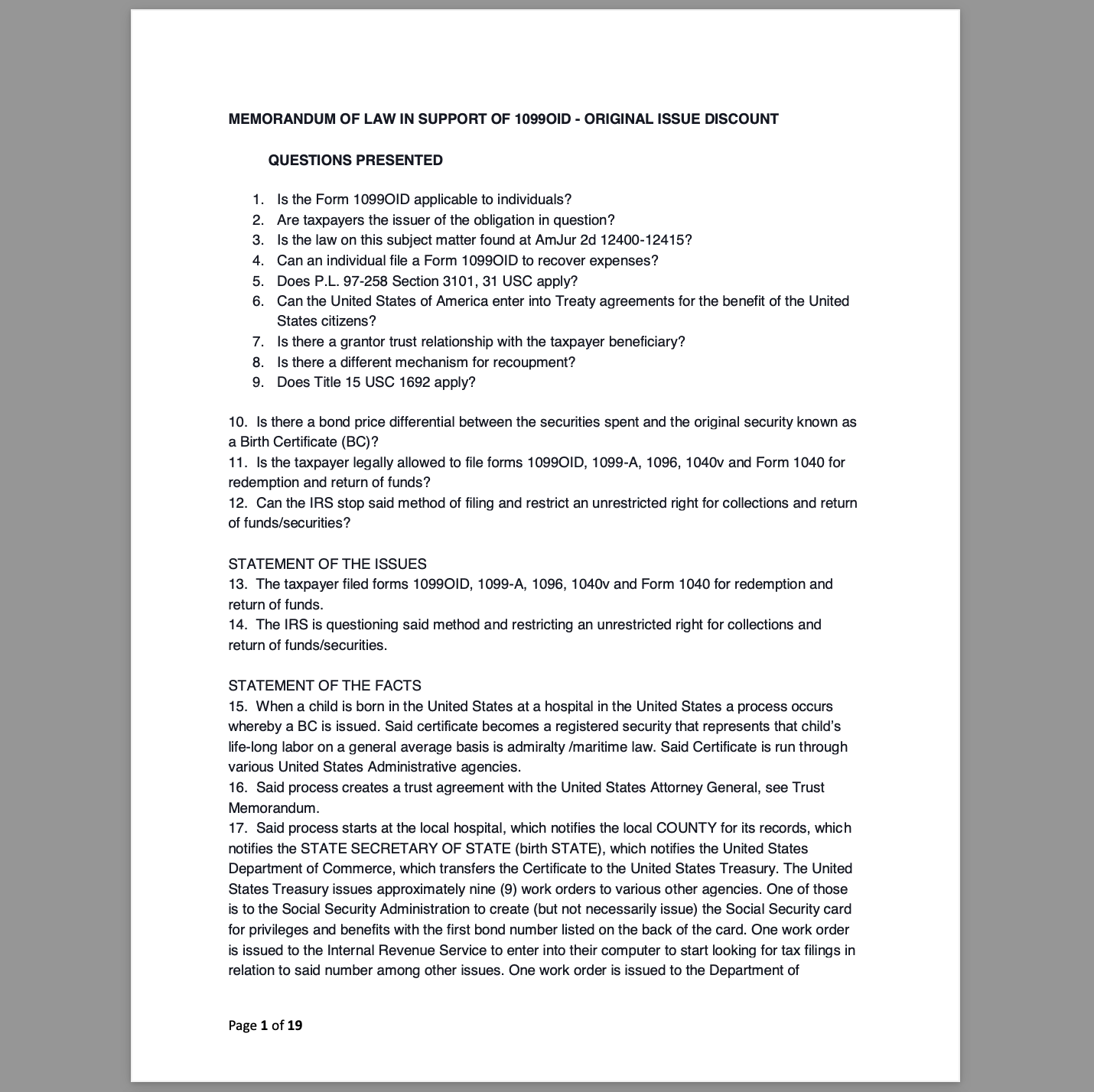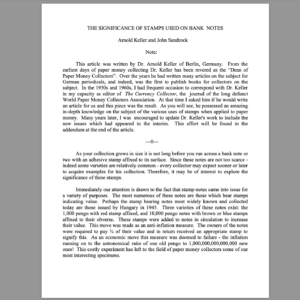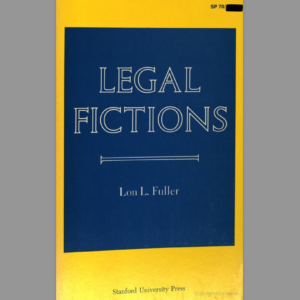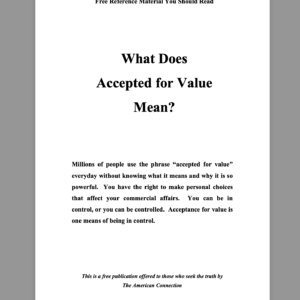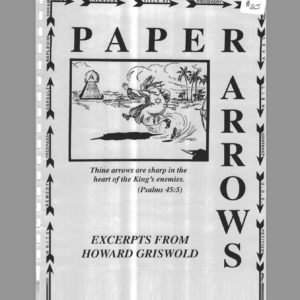Description
Pages total: 19
|
|
|
10. Is there a bond price differential between the securities spent and the original security known as a Birth Certificate (BC)? 12. Can the IRS stop said method of filing and restrict an unrestricted right for collections and return of funds/securities? STATEMENT OF THE ISSUES STATEMENT OF THE FACTS |
|
16. Said process creates a trust agreement with the United States Attorney General, see Trust Memorandum. |
|
is issued to the Internal Revenue Service to enter into their computer to start looking for tax filings in relation to said number among other issues. One work order is issued to the Department of |
Page 1 of 19
|
Engraving and Printing (DEP). The DEP in turn issues a work order to the New York Federal Reserve to issue Federal Reserve Notes (FRNs) into circulation using the number on the backside of the Social Security number as law of future interest securities property to back the FRNs placed into circulation. |
|
21. Black’s Law Dictionary 8th Edition, page 1133, defines “original-issue discount. The difference between a bond’s face value and the price at which it is initially sold. – Abbr. OID.” 23. Barron’s Law Dictionary (1991) defines, on page 422, “Redeemable Bond a bond that is callable for payment by the issuer.” 26. The older UCC 8-107(1) stated, “(1) Unless otherwise agreed and subject to any applicable law or regulation respecting short sales, a person obligated to transfer securities may transfer any certificated security of the specified issue in bearer form or registered in the name of the transferee, or indorsed to him or in blank, or he may transfer an equivalent uncertificated security to the transferee or a person designated by the transferee.” 27. The current section of the UCC regarding transfers is sections UCC 8-209 and 8-303. |
|
(8) digits with a letter in front. The letter represents which Federal Reserve banking center holds those funds in trust on that bond. For example, the letter “F” would be the Atlanta, Georgia, Federal Reserve center. |
|
the original issue of the securities known as FRNs. |
Page 2 of 19
|
32. The birth certificate based “funds” are kept at the DTC and invested in various transactions on planet earth by investment “managers.” 34. Therefore, it appears that The Source is the ultimate Creditor/Lender and Recipient in some relations and Payor in others. 37. Therefore, when a party of The Source applies to a for-profit, licensed institution called a “bank” holding registered securities called FRNs for grantors/beneficiaries who may be first party bailors. |
|
38. Barron’s Law Dictionary (1991) defines, on page 157, “Draw see draft.” On page 156, “Draft an order in writing directing a person other than the maker to pay a specified sum of money to a named person;…” 40. The method of redemption of The Source’s future interest is the filing of IRS Form 1099OID. This shows what was expended by The Source that is being redeemed. In section 12430 “Cash method debt instrument defined. For purposes of the issue price as 12429, a cash method debt instrument is a debt instrument issued in exchange for property (other than new section 38 property) if: (a) The stated principle amount doesn’t exceed a specified dollar limit [Code Sec. 1274A(b); Code Sec. 1274A(c)(2)(A)] ($3,307,400 for sales and exchanges in 2006); [Rev. Rul. 2005-76, 2005-49 IRB 1072]
1274A(c)(2)(B)] |
|
instrument; [Code Sec. 1274A(c)(2)(C)] and “A debt instrument issued in a debt-for-debt exchange that qualifies as an exchange under Code sec. 1001 is eligible to a cash method debt instrument if the requirements are met.” [Reg. 1.1274A- |
|
1(c)(3)] |
Page 3 of 19
In section 12341. “How to elect cash method debt instrument treatment. The borrower and lender make the election to treat a debt instrument as a cash method debt instrument by jointly signing a statement that includes their names, addresses, and taxpayer identification number; a clear indication that the election is being made; and a declaration that the instrument with respect to which the election is being made fulfills the requirements of a cash method debt instrument. The borrower and lender must sign the statement by the due date (including extensions) for filing the borrower’s or lender’s return (whichever is earlier) for the tax year in which the instrument is issued, and attach it, or copy, to their timely filed returns.” [Reg. 1.1274A-1(c)(1)]
|
1. In the post-1930s New Deal the UNITED STATES OF AMERICA is a parent company (28 |
|
USC 3002(15)(c)) to the STATES of that private Federal Union and is demonstrated by the case of Dyett vs. Turner, 439 P2d 266 (1968). This is significant in that the STATE BIRTH CERTIFICATE represents a future interest in securities by The Source and is lent to the STATE and therefore, to the UNITED STATES OF AMERICA and its alleged parent relations. 2. On STATE OF CALIFORNIA Birth Certificates in the bottom left hand corner it states, “American Bank Note Company.” This writer believes that to be a tacit empirical admission that The Source is the ultimate creditor. |
DISCUSSION 1
THE SECURITIES USED BY TAXPAYER IN COMMERCE ARE WORTH LESS THAN THOSE ORIGINALLY PLACED INTO COMMERCE BY TAXPAYER
1. The notions of “fair play and substantial justice” as well as “good faith” in any relation require the Internal Revenue Service to perform the duties agreed upon in the agreement between taxpayer/Authorized Representative/Beneficiary and Trustee/United States Attorney General/Alien Property Custodian (50 USC Appx 12).
- The United States Constitution states in Article 1 section 10, “no state . . . shall impair the obligation of contract.”
- FACT: all 50 several state constitutions recognize the right to contract in the
preamble.
- FACT: The People have a right to convert their future rights to property if they so
choose.
- FACT: The People have the right to lend their future labor to government(s).
- FACT: Through the birth Certificate and other relations The People did individually
lend their future labor interest by assent to the Federal (and therefore, the STATE)
government to cover their issues, underwriting, expenses, etc.
- FACT: The People are therefore owed property and not the reverse.
7. FACT: The method of collecting on that stock of the corporation known as UNITED STATES OF AMERICA (14 Stat. 4) can be a number of different ways.
Page 4 of 19
|
|
DISCUSSION 2
THE MECHANICS OF FILING FOR THE REFUND ON THE ORIGINAL ISSUE
|
1. The Internal Revenue Code, if viewed through the “lenses” of the Social Security trust agreement demonstrates; 1) that a security interest was established at birth, 2) said personal property (labor) was placed in trust with the USAG, 3) the Social Security Administration’s job is to track covered employment wages, 4) the IRS’s job is to track excise taxable activities and keep an accounting of the trust’s activities, 5) the Department of Justice’s job is to keep track of the trust’s accounting during criminal investigations to pay/setoff expenses and reimburse for administrative/court costs as well as reimburse victims from the |
|
perpetrators trust account. |
Page 5 of 19
3. Title 26 USC Section 671-679 deals with grantor trust rules.
|
Subpart E – Grantors and Others Treated as Substantial Owners |
|
Sec. 679. Foreign trusts having one or more United States beneficiaries. |
1. In light of the fact that the taxpayer is a qualified investor, for the United States of America in accord with 14 Stat 4 as a stockholder, Title 26 USC Sec. 163 dealing with interest would apply to the refund through the OID process.
|
Title 26 USC Sec. 163. Interest (e) Original issue discount (1) In general |
|
(1) In general |
Page 6 of 19
|
Nothing in subsection (a) or in any other provision of law shall be construed to provide a deduction for interest on any registration-required obligation unless such obligation is in For purposes of this section – (i) is issued by a natural person, |
|
(B) Certain obligations not included (i) there are arrangements reasonably designed to ensure that such obligation will be sold (or resold in connection with the original issue) only to a person who is not a United States person, and (ii) in the case of an obligation not in registered form – (B), shall not apply to any obligation if – (i) in the case of – (I) subparagraph (A), such obligation is of a type which the Secretary has determined by regulations to be used frequently in avoiding Federal taxes, or (II) subparagraph (B), such obligation is of a type specified by the Secretary in regulations, and (ii) such obligation is issued after the date on which the (3) Book entries permitted, etc. |
1. Title 26 USC 165(g) Worthless Securities
|
(g) Worthless securities (1) General rule |
|
last day of the taxable year, of a capital asset. (2) Security defined |
Page 7 of 19
For purposes of this subsection, the term ”security” means –
(A) a share of stock in a corporation;
(B) a right to subscribe for, or to receive, a share of stock in a corporation; or
(C) a bond, debenture, note, or certificate, or other evidence of indebtedness, issued by a corporation or by a government or political subdivision thereof, with interest coupons or in registered form.
|
1. Title 26 USC Part V lays out the rules for bonds and other debt instruments. The Federal Reserve Notes (FRNs) and the BC are debt instruments. The FRNs are public debt instruments from the Federal Reserve to the US Treasury. The BC is a future interest bond lent from the taxpayer to the US Treasury through the Bureau of Public Debt and the DTC |
|
supporting the public registered securities known as FRNs. However, the time span from original issue of the BC and the use of FRNs by the tax payer is at least 18 years. In that time to maturity (literally) the difference between Original Issue and redemption with the expansion of the FRNs in circulation is quite large because of the expansion and monetization of said securities/ FRNs. Therefore, what is being spent by the taxpayer is a diminished security. Therefore, the refund of Original Issue being discounted applies to a transaction by the taxpayer whose funds have been reduced in value. Therefore the following IRC sections apply and support this premise of refund.
|
|
Subpart Subpart A – Original Issue Discount |
|
Sec. |
|
principal amount does not exceed $2,800,000. 1275. Other definitions and special rules. |
Page 8 of 19
- When the taxpayer uses the public funds to “buy” goods and services he is involved in a closed loop of finance wherein the securities (FRNs or check book currency) used have already been discounted due to time of delivery and use by the taxpayer.
- Sec. 1271. Treatment of amounts received on retirement or sale or exchange of debt instruments
|
(a) General rule |
|
(2) Ordinary income on sale or exchange where intention to call (i) the original issue discount, reduced by |
|
the District of Columbia, which has a fixed maturity date not more than 1 year from the date of issue. Such term does not include any tax-exempt obligation. (D) Ratable share |
|
is an amount which bears the same ratio to such discount as – |
Page 9 of 19
|
(ii) the number of days after the date the taxpayer acquired the obligation and up to (and including) the date of its maturity. (i) the taxpayer’s yield to maturity based on the taxpayer’s cost of acquiring the obligation, and |
|
obligation, any gain realized which does not exceed an amount equal to the ratable share of the original issue discount shall be treated as ordinary income. For purposes of this paragraph, the term ”short-term nongovernment obligation” means any obligation which – (ii) is not a short-term Government obligation (as defined in paragraph (3)(B) without regard to the last sentence thereof). subparagraph (D), the ratable share of the original issue discount is an amount which bears the same ratio to such discount as – (D) Election of accrual on basis of constant interest rate |
|
taxpayer held the obligation determined (under regulations prescribed by the Secretary) on the basis of – (ii) compounding daily. |
|
(1) In general |
Page 10 of 19
|
(A) any obligation issued by a natural person before June 9, 1997, and |
|
such form on March 1, 1954. |
1. Sec. 1272. Current inclusion in income of original issue discount
|
instrument having original issue discount issued after July 1, 1982, an amount equal to the |
Page 11 of 19
|
sum of the daily portions of the original issue discount for each day during the taxable year on which such holder held such debt instrument. (iii) Treatment of husband and wife Sec. 1273. Determination of amount of original issue discount (2) Other debt instruments not issued for property |
|
property and not publicly offered, the issue price of each such instrument is the price paid by the first buyer of such debt instrument. In the case of a debt instrument which is issued for property and which – (B)(i) is issued for stock or securities which are traded on Sec. 1275. Other definitions and special rules (a) Definitions |
|
Except as provided in subparagraph (B), the term ”debt (C) Other debt instruments |
|
sale or exchange. |
Page 12 of 19
|
The term ”tax-exempt obligation” means any obligation if – |
|
In the case of any debt instrument, if – Sec. 1283. Definitions and special rules (a) Definitions |
|
not more than 1 year from the date of issue. (2) Double inclusion in income not required Section 1281 shall not require the inclusion of any amount previously includible in gross income. |
|
Section 454(b) and paragraphs (3) and (4) of section 1271(a) shall not apply to any short-term obligation to which section 1281 applies. |
Page 13 of 19
DISCUSSION 3
IRS PERSONNEL CANNOT OVERRULE DECLARATIONS MADE BY THE ORIGINAL SOURCE OF THE CREDIT
1. The notions of “fair play and substantial justice” as well as “good faith” in any relation require plaintiff to perform the duties agreed upon in the agreement between the taxpayer and the British Crown by International Treaty.
1. Whether the payments were made is determined by the taxpayer and the taxpayer, having personal knowledge of the facts, is the only party that can prove, either by receipts or affidavit, that the “bond”/securities “payments” were made.
2. Therefore, whatever is filed by the taxpayer stands as fact until rebutted with facts to counter the claim.
DISCUSSION 4
REDUCTION OF PUBLIC DEBT AND REDEMPTION
- The notions of “fair play and substantial justice” as well as “good faith” in any relation require the United States Treasury through the IRS to utilize securities tendered by the Source of Original Issue Discount credit (aka taxpayer) for debt reduction.
- Based upon Title 31 USC it appears that there exist provisions for the Source of Original Issue Discount credit (aka taxpayer) to reduce public debt and perform redemption by and through government agencies.
- TITLE 31 > SUBTITLE III > CHAPTER 31 > SUBCHAPTER I > § 3113
|
§ 3113. Accepting gifts |
|
(C) other intangible personal property made only on the condition that the property is sold and the proceeds from the sale used to reduce the public debt; and may reject a gift under this section when the rejection is in the interest of the Government. |
Page 14 of 19
|
(c) The Secretary and the Administrator shall convert a gift either of them accepts under subsection (a)(1)(C) or (2) of this section to money on the best terms available. If a gift accepted under subsection (a) of this section is subject to a gift or inheritance tax, the Secretary or the Administrator may pay the tax out of the proceeds of the gift or the proceeds of the redemption or sale of the gift. (d) The Treasury has an account into which money received as gifts and proceeds from the sale or redemption of gifts under this section shall be deposited. The Secretary shall use the money in the account to pay at maturity, or to redeem or buy before maturity, an obligation of the Government included in the public debt. An obligation of the Government that is paid, redeemed, or bought with money from the account shall be canceled and retired and may not be reissued. Money deposited in the account is appropriated and may be expended to carry out this section. (e) |
|
(1) The Secretary shall redeem a direct obligation of the Government bearing interest or sold on a discount basis on receiving it when the obligation— (A) is given to the Government; TITLE 31 > SUBTITLE III > CHAPTER 31 > SUBCHAPTER II > § 3128 § 3128. Proof of death to support payment |
|
DISCUSSION 5 |
|
1. The notions of “fair play and substantial justice” as well as “good faith” in any relation require with the United States Treasury and IRS therein is to recognize the simple fact that the FRNs/money of account originally issued on future interest of stockholder/ grantor of the USA has a mechanism in the tax code to recognize and adjust for determining gain or loss of |
|
said securities relation. 2. 1939 tax code; |
Page 15 of 19
UNITED STATES, STATUTES AT LARGE, CONTAINING THE LAWS AND CONCURRENT RESOLUTIONS ENACTED DURING THE FIRST SESSION OF THE SEVENTY-SIXTH CONGRESS OF THE UNITED STATES OF AMERICA 1939 AND TREATIES, INTERNATIONAL AGREEMENTS OTHER THAN TREATIES, AND PROCLAMATIONSCOMPILED, EDITED, INDEXED, AND PUBLISHED BY AUTHORITY OF LAW UNDER THE DIRECTION OF THE SECRETARY OF STATE VOLUME 53 PART 1 INTERNAL REVENUE CODE APPROVED FEBRUARY 10, 1939 UNITED STATES
GOVERNMENT PRINTING OFFICE, WASHINGTON: 1939
1. INCOME TAX 37 Supplement B—Computation of Net Income
[Supplementary to Subchapter B, Part II]
85. SEC. 112. RECOGNITION OF GAIN OR LOSS.
(a) GENERAL RULE.—Upon the sale or exchange of property the
entire amount of the gain or loss, determined under section 111, shall be recognized, except as hereinafter provided in this section.
(f) INVOLUNTARY CONVERSIONS.—If property (as a result of its
destruction in whole or in part, theft or seizure, or an exercise of
the power of requisition or condemnation, or the threat or imminence
thereof) is compulsorily or involuntarily converted into property
similar or related in service or use to the property so converted, or into money which is forthwith in good faith, under regulations prescribed by the Commissioner with the approval of the Secretary, expended in the acquisition of other property similar or related in
service or use to the property so converted, or in the acquisition of control of a corporation owning such other property, or in the
establishment of a replacement fund, no gain or loss shall be recognized. If any part of the money is not so expended, the gain, if any, shall be recognized, but in an amount not in excess of the money which is not so expended.
1. SEC. 113. ADJUSTED BASIS FOR DETERMINING GAIN OR LOSS.
|
(a) BASIS (UNADJUSTED) OF PROPERTY.—The basis of property shall be the cost of such property; except that— |
Page 16 of 19
|
in the amount of gain or decreased in the amount of loss recognized to the grantor upon such transfer under the law applicable to the year in which the transfer was made. (6) TAX-FREE EXCHANGES GENERALLY |
|
DISCUSSION 6 |
- The current tax code post 1986 derives its taxing authority through the 1954 and 1939 tax codes and therefore definitions in 1938 apply therein.
- UNITED STATES STATUTES AT LARGE CONTAINING THE LAWS AND CONCURRENT RESOLUTIONS ENACTED DURING THE THIRD SESSION OF THE SEVENTY-FIFTH CONGRESS OF THE UNITED STATES OF AMERICA 1938 AND TREATIES, INTERNATIONAL AGREEMENTS OTHER THAN TREATIES, AND PROCLAMATIONS.
- SEC. 4. SPECIAL CLASSES OF TAXPAYERS.
(f) Individual citizens of any possession of the United States who are not otherwise citizens of the United States and who are not residents of the United States,—Supplement J.
(g) Individual citizens of the United States or domestic corporations, satisfying the conditions of section 251 by reason of deriving a large portion of their gross income from sources within a possession of the United States,—Supplement J.
|
domiciled outside of the several states within the confines of the US Territories. 2. SEC. 117. CAPITAL GAINS AND LOSSES. |
|
(a) DEFINITIONS.—As used in this title— |
|
ordinary course of his trade or busi- ness, or property, used in the trade or business, of a character which is subject to the allowance for depreciation provided in section 23 (1); |
Page 17 of 19
(2) SHORT-TERM CAPITAL GAIN.—The term “short-term capital gain” means gain from the sale or exchange of a capital asset held for not more than 18 months, if and to the extent such gain is taken into account in computing net income;
(3) SHORT-TERM CAPITAL LOSS.—The term “short-term capital loss” means loss from the sale or exchange of a capital asset held for not more than 18 months, if and to the extent such loss is taken into account in computing net income;
1. SEC. 23. DEDUCTIONS FROM GROSS INCOME.
|
(d) TAXES OF SHAREHOLDER PAID BY CORPORATION.—The deduction for taxes allowed by subsection (c) shall be allowed to a corporation in the case of taxes imposed upon a shareholder of |
|
the corporation upon his interest as shareholder which are paid by the corporation without reimbursement from the shareholder, but in such cases no deduction shall be allowed the shareholder for the amount of such taxes. (g) CAPITAL LOSSES.— |
1. The statutorily constructed scheme to create such a system of “covered employment” with securities laws was enacted by and through the 1935 Social Security Act. Therein, the above sections (and more) of the 1938 tax code apply.
DISCUSSION 7
IRS AGENTS MAY BE ENGAGED IN MASSIVE THEFT
- The notions of “fair play and substantial justice” as well as “good faith” in any relation require the IRS to at least review accounting records to determine if IRS personnel involved engaged in wrong doing to commit larceny and fraudulent conveyance of taxpayer funds.
- The premise that IRS agents may be engaged in filing false and inaccurate Substitute for Returns (SFR) and then manipulating the computer records in over-ride mode to cover up their theft is not without merit.
Page 18 of 19
3.
4. 5. 6. 7.
The IRS has been known to put information concerning SFR returns on the IRS computers pursuant to 6020(b) authority, but fail to input any information on the SFR or sign it as preparer as required by §6052.
The only way IRS personnel can input any data on the computer without data being put on the Form 1040 first is to use “override” wherein they can input any data they want.
The IRS personnel that input the data on the computer can be found only on the security tape used by the IRS, this data cannot be erased.
The IRS is required to send the taxpayer the SFR first for review, and can use §6020(b) only if the taxpayer as an individual refuses to sign the Form 1040 after presented the Form 1040. When one IRS agent was confronted with this information he walked out of a meeting (and out of the IRS building) without making any other statements and never returned. I.e. he had been caught.
100. Therefore, it would appear that some IRS agents are taking advantage of taxpayer ignorance, collecting data, filing false SFR’s, filing forms 1099-A, 1040, 1099-OID, etc. and having the refund shipped to a third party account, then manipulating the computer data and referring prosecution for alleged willful failure to file with the US Attorney.
101. A review of the security tape would correct this (now) presumption of larceny, theft and fraud.
CONCLUSION
102. It would offend the notions of fair play and substantial justice to assert that the IRS can simply ignore and dismiss “just because they can” filings completed with forms 1099OID, et. al.
103. Clearly the taxpayer is owed a refund based upon the foregoing.
104. The IRS should return to source that which belongs to The Source, the taxpayer.
105. The IRS should issue the refund as requested or instruct the taxpayer what deficiency with the OID form that allegedly exists.
Page 19 of 19

